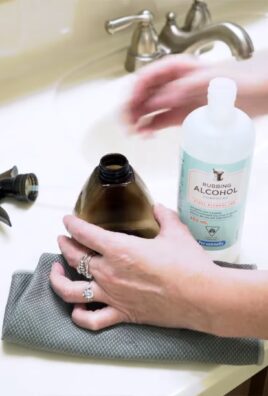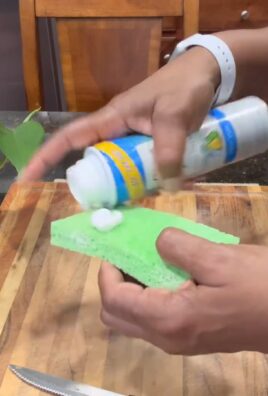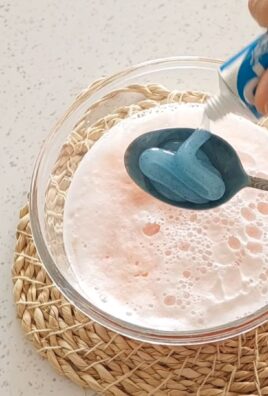Surprising Vinegar Uses: Prepare to be amazed! Did you know that the humble bottle of vinegar sitting in your pantry is actually a secret weapon for your home and garden? For generations, vinegar has been a staple in households, not just for cooking, but also for cleaning and even medicinal purposes. Think back to your grandmother’s remedies – chances are, vinegar played a starring role!
But beyond its historical uses, vinegar holds a treasure trove of practical applications that can simplify your life and save you money. In this article, I’m going to reveal some truly surprising vinegar uses that will transform the way you think about this versatile liquid. Forget expensive, chemical-laden products – vinegar offers a natural, effective, and budget-friendly alternative for tackling a wide range of tasks.
From banishing weeds in your garden to reviving tired laundry and even creating stunning DIY beauty treatments, the possibilities are endless. So, grab that bottle of vinegar and get ready to unlock its hidden potential! I promise, you’ll be saying “Wow, I never knew vinegar could do that!” by the end of this article. Let’s dive in and discover the magic of vinegar together!

Unlocking the Power of Vinegar: Surprising DIY Hacks You Need to Know
Vinegar. It’s that tangy liquid sitting in your pantry, usually reserved for salad dressings and pickling. But trust me, this humble ingredient is a powerhouse of DIY possibilities! I’m going to share some of my favorite surprising vinegar uses that will save you money, time, and maybe even a trip to the store. Get ready to be amazed!
Cleaning Powerhouse: Vinegar to the Rescue!
Vinegar’s acidity makes it a fantastic natural cleaner. It cuts through grease, dissolves mineral deposits, and even disinfects. Here’s how I use it around my house:
- All-Purpose Cleaner: Ditch those harsh chemicals! A simple vinegar solution works wonders.
- Shower Head Savior: Say goodbye to mineral buildup that clogs your shower head.
- Microwave Magic: Steam clean your microwave with vinegar for easy grime removal.
- Coffee Maker Cleaner: Keep your coffee tasting fresh by descaling your coffee maker with vinegar.
- Laundry Booster: Vinegar can soften clothes, remove odors, and even brighten whites.
Making Your All-Purpose Vinegar Cleaner
This is my go-to cleaner for almost everything! It’s cheap, effective, and smells way better than those chemical-laden sprays.
- Gather Your Supplies: You’ll need white distilled vinegar, water, an empty spray bottle, and optionally, a few drops of your favorite essential oil (lemon, lavender, or tea tree are great choices).
- Mix the Solution: In the spray bottle, combine equal parts white distilled vinegar and water. For a stronger cleaning solution, you can use a higher concentration of vinegar. I usually go for a 1:1 ratio for general cleaning.
- Add Essential Oils (Optional): If you want to mask the vinegar smell, add 10-20 drops of your chosen essential oil. Shake well to combine.
- Spray and Wipe: Spray the solution onto the surface you want to clean and wipe with a clean cloth or sponge. For stubborn stains, let the solution sit for a few minutes before wiping.
Cleaning Your Shower Head with Vinegar
Hard water can leave mineral deposits that clog your shower head, reducing water pressure and making your shower less enjoyable. Here’s how to fix it with vinegar:
- Gather Your Supplies: You’ll need white distilled vinegar, a plastic bag (a sandwich bag works well), a rubber band or twist tie, and an old toothbrush.
- Fill the Bag with Vinegar: Pour enough white distilled vinegar into the plastic bag to completely submerge the shower head.
- Secure the Bag: Carefully place the bag over the shower head, ensuring that the shower head is fully immersed in the vinegar. Use the rubber band or twist tie to secure the bag to the shower head.
- Soak Overnight: Let the shower head soak in the vinegar overnight (or for at least a few hours). This will give the vinegar time to dissolve the mineral deposits.
- Remove and Scrub: Remove the bag and discard the vinegar. Use the old toothbrush to scrub away any remaining mineral deposits.
- Rinse and Enjoy: Rinse the shower head thoroughly with water. Run the shower for a few minutes to flush out any remaining vinegar and debris. Your shower head should now be clean and free of mineral buildup!
Microwave Steam Cleaning with Vinegar
This is a super easy way to clean your microwave without any scrubbing!
- Gather Your Supplies: You’ll need white distilled vinegar, water, and a microwave-safe bowl.
- Mix the Solution: In the microwave-safe bowl, combine 1 cup of water and 2 tablespoons of white distilled vinegar.
- Microwave the Solution: Place the bowl in the microwave and heat on high for 5-10 minutes, or until the solution is boiling and the microwave is filled with steam.
- Let it Sit: Leave the microwave door closed for a few minutes to allow the steam to loosen any grime and food splatters.
- Wipe Clean: Carefully remove the bowl (it will be hot!) and wipe down the inside of the microwave with a clean cloth or paper towel. The grime should wipe away easily.
Descaling Your Coffee Maker with Vinegar
Regularly descaling your coffee maker is essential for keeping it running smoothly and ensuring your coffee tastes its best.
- Gather Your Supplies: You’ll need white distilled vinegar and water.
- Mix the Solution: Fill the coffee maker’s water reservoir with a solution of equal parts white distilled vinegar and water.
- Run a Brewing Cycle: Start a normal brewing cycle. Allow the coffee maker to brew halfway through the solution, then turn it off and let it sit for 30 minutes to an hour. This allows the vinegar to dissolve any mineral deposits.
- Finish the Brewing Cycle: Turn the coffee maker back on and allow it to complete the brewing cycle.
- Rinse Thoroughly: After the brewing cycle is complete, discard the vinegar solution and rinse the coffee maker thoroughly by running several cycles with fresh water only. This will remove any remaining vinegar taste.
Vinegar as a Laundry Booster
I swear by this! It’s a natural way to soften clothes and get rid of odors.
- Add Vinegar to the Rinse Cycle: Pour 1/2 cup of white distilled vinegar into the fabric softener dispenser of your washing machine.
- Wash as Usual: Wash your clothes as you normally would. The vinegar will help to soften the fabric, remove odors, and brighten whites.
Gardening Guru: Vinegar in the Garden
Believe it or not, vinegar can be a gardener’s best friend! I use it for:
- Weed Killer: A natural alternative to harsh herbicides.
- Soil Acidifier: Great for plants that love acidic soil, like azaleas and blueberries.
- Pest Control: Keeps ants and other unwanted critters away.
Vinegar Weed Killer
This is a great way to get rid of weeds without using harmful chemicals. Be careful, though! Vinegar will kill any plant it comes into contact with, so use it carefully and avoid spraying your desired plants.
- Gather Your Supplies: You’ll need white distilled vinegar (5% acidity), a spray bottle, and optionally, a few drops of dish soap (this helps the vinegar stick to the weeds). Horticultural vinegar (20% acidity) is even more effective, but use it with extreme caution as it can cause burns.
- Mix the Solution: Pour the vinegar into the spray bottle. If using dish soap, add a few drops and shake gently to combine.
- Spray the Weeds: On a sunny day, spray the vinegar directly onto the weeds, being careful to avoid spraying any desirable plants.
- Repeat as Needed: The weeds should start to wilt and die within a few days. You may need to repeat the application for stubborn weeds.
Acidifying Soil with Vinegar
Some plants, like azaleas, rhododendrons, and blueberries, thrive in acidic soil. You can use vinegar to lower the pH of your soil.
- Test Your Soil’s pH: Before adding vinegar, it’s a good idea to test your soil’s pH to see if it needs to be acidified. You can purchase a soil testing kit at most garden centers.
- Mix the Solution: Mix 1 cup of white distilled vinegar with 1 gallon of water.
- Water the Plants: Slowly water the plants with the vinegar solution, being careful not to overwater.
- Retest the Soil: After a few weeks, retest the soil’s pH to see if it has reached the desired level. You may need to repeat the application to achieve the desired pH.
Vinegar as Pest Control
Vinegar can deter ants and other pests from your garden.
- Identify the Problem Areas: Look for areas where you see ants or other pests.
- Spray with Vinegar: Spray the affected areas with white distilled vinegar. You can also spray vinegar around the perimeter of your garden to create a barrier.
- Repeat as Needed: Reapply the vinegar every few days, or after it rains.
Beauty Booster: Vinegar for Skin and Hair
Okay, this might sound a little crazy, but vinegar can actually be beneficial for your skin and hair! I use it for:
- Hair Rinse: Adds shine and removes buildup.
- Facial

Conclusion
So, there you have it – a glimpse into the surprisingly versatile world of vinegar! We’ve explored just a few of the many ways this humble pantry staple can be used beyond the kitchen, offering simple, cost-effective solutions for cleaning, beauty, and even gardening. From banishing stubborn stains to adding shine to your hair, vinegar proves time and again that it’s a true multi-tasker.
But why is this DIY approach a must-try? Simply put, it’s about taking control. You’re reducing your reliance on harsh chemicals, saving money, and embracing a more sustainable lifestyle. Many commercial cleaning products are packed with ingredients that can be harmful to both your health and the environment. By opting for vinegar, you’re choosing a natural alternative that’s gentle yet effective. Plus, the satisfaction of creating your own solutions and seeing them work wonders is incredibly rewarding.
Consider these variations to further personalize your vinegar experience. Infuse white vinegar with citrus peels for a fresh-smelling all-purpose cleaner. Add a few drops of your favorite essential oil, like lavender or tea tree, for added antibacterial and aromatherapy benefits. For a more potent cleaning solution, combine vinegar with baking soda – just be prepared for the fizz! In the garden, experiment with different dilutions of vinegar to control weeds or acidify the soil for plants that thrive in acidic conditions. Remember to always test any new solution in an inconspicuous area first to ensure it doesn’t damage the surface.
The possibilities are truly endless when it comes to surprising vinegar uses. We encourage you to embrace your inner DIY enthusiast and give these tricks a try. You might be amazed at the results! Don’t be afraid to experiment and find what works best for you and your home.
More importantly, we want to hear about your experiences! Did you discover a new and innovative way to use vinegar? Did one of our suggestions work particularly well for you? Share your tips, tricks, and stories in the comments below. Let’s create a community of vinegar enthusiasts and learn from each other. Together, we can unlock even more of the hidden potential of this amazing ingredient and make our lives a little bit cleaner, greener, and more affordable. So go ahead, grab that bottle of vinegar, and get ready to be surprised! We are confident that you will find these tips useful and will be able to incorporate them into your daily life. Remember, a little vinegar can go a long way!
Frequently Asked Questions (FAQ)
What type of vinegar is best for cleaning?
White distilled vinegar is generally considered the best type of vinegar for cleaning. It’s clear, inexpensive, and has a relatively high acidity level (around 5%), which makes it effective at dissolving dirt, grime, and mineral deposits. Avoid using colored vinegars, such as apple cider vinegar or balsamic vinegar, as they can stain surfaces. While apple cider vinegar has its own set of benefits, it’s not ideal for general cleaning purposes due to its color and lower acidity.
Is vinegar safe to use on all surfaces?
No, vinegar is not safe to use on all surfaces. Avoid using vinegar on natural stone surfaces like marble, granite, and limestone, as the acidity can etch and damage them. It’s also not recommended for use on waxed wood furniture, as it can strip the wax finish. Additionally, avoid using vinegar on electronics screens, as it can damage the anti-glare coating. Always test vinegar on an inconspicuous area first to ensure it doesn’t cause any damage or discoloration. When in doubt, consult the manufacturer’s instructions for cleaning specific surfaces.
Can I mix vinegar with bleach?
No, absolutely not! Mixing vinegar with bleach is extremely dangerous and can create toxic chlorine gas. This gas can cause severe respiratory irritation, burns, and even death. Never mix vinegar with bleach or any other cleaning products containing ammonia. Always use vinegar separately and follow safety precautions when handling any cleaning chemicals.
How can I get rid of the vinegar smell after cleaning?
The vinegar smell typically dissipates within a few hours. To speed up the process, you can open windows and doors to ventilate the area. You can also place bowls of baking soda around the room to absorb the odor. Another option is to simmer a pot of water with citrus peels or herbs like cinnamon or cloves to create a pleasant aroma. Adding a few drops of essential oils, such as lavender or lemon, to your cleaning solution can also help mask the vinegar smell.
Can I use vinegar to clean my coffee maker?
Yes, vinegar is an excellent natural descaler for coffee makers. To clean your coffee maker with vinegar, fill the water reservoir with a solution of equal parts white vinegar and water. Run the coffee maker through a full brewing cycle. Then, run two cycles with fresh water to rinse away any remaining vinegar. This will help remove mineral buildup and improve the performance of your coffee maker.
Is vinegar effective at killing mold?
Vinegar can be effective at killing some types of mold, but it’s not a substitute for professional mold remediation in severe cases. To kill mold with vinegar, spray undiluted white vinegar onto the affected area and let it sit for an hour. Then, scrub the area with a brush and wipe it clean with a damp cloth. Repeat as needed. However, it’s important to note that vinegar may not be effective against all types of mold, and it may not penetrate porous surfaces deeply enough to kill the mold at its roots. For extensive mold problems, it’s best to consult with a professional mold remediation specialist.
Can I use vinegar to remove hard water stains?
Yes, vinegar is very effective at removing hard water stains from faucets, showerheads, and other surfaces. To remove hard water stains, soak a cloth or paper towel in white vinegar and wrap it around the affected area. Let it sit for several hours or overnight. Then, scrub the area with a brush or sponge and rinse with water. For stubborn stains, you may need to repeat the process. You can also fill a plastic bag with vinegar and secure it around a showerhead or faucet with a rubber band to soak away the mineral deposits.
What are some surprising vinegar uses in the garden?
Vinegar has several surprising uses in the garden. It can be used to control weeds by spraying undiluted white vinegar directly onto the weeds. Be careful not to spray it on desirable plants, as it can also kill them. Vinegar can also be used to acidify the soil for plants that thrive in acidic conditions, such as azaleas and blueberries. Dilute white vinegar with water (about 1 tablespoon per gallon of water) and use it to water these plants. Additionally, vinegar can be used to clean clay pots and remove mineral deposits from garden tools.
How can I use vinegar to freshen laundry?
Vinegar can be used to freshen laundry and remove odors. Add 1/2 cup of white vinegar to the fabric softener dispenser of your washing machine. Vinegar helps to neutralize odors, soften fabrics, and remove detergent residue. It can also help to brighten whites and prevent colors from fading. Don’t worry about the vinegar smell; it will dissipate during the wash cycle.
Are there any precautions I should take when using vinegar?
Yes, there are a few precautions to keep in mind when using vinegar. Always wear gloves when handling vinegar, especially if you have sensitive skin. Avoid getting vinegar in your eyes, as it can cause irritation. If you do get vinegar in your eyes, rinse them immediately with water. Store vinegar in a cool, dry place away from children and pets. And as mentioned before, never mix vinegar with bleach or other cleaning products containing ammonia. Always use vinegar in a well-ventilated area to avoid inhaling the fumes.




Leave a Comment